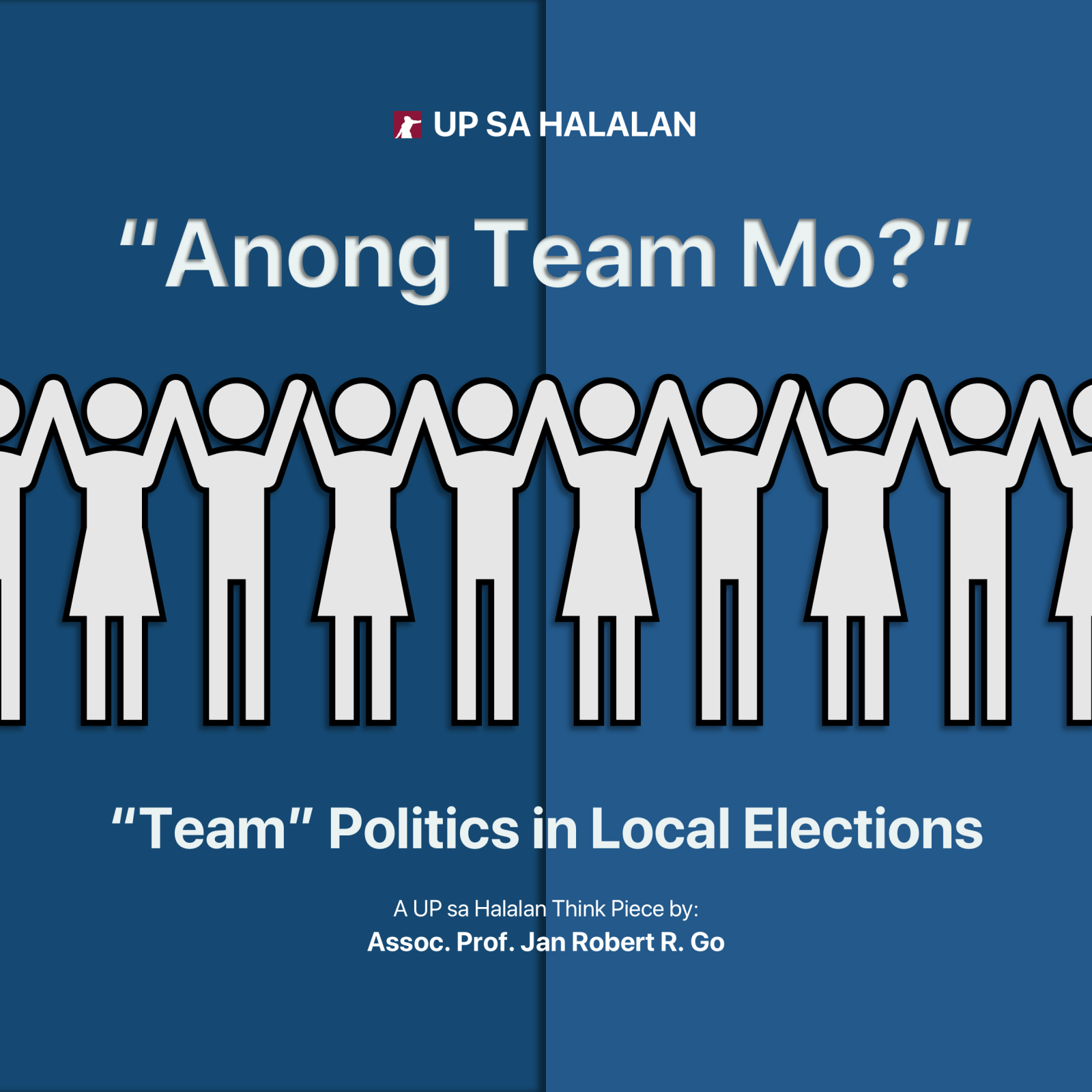If teams are the mechanism of the elite, the same can be said for the new breed of politicians seeking to replace those who have held power for a long time.

The 2025 local elections take on a new face—the face of “teams.” Local politicians are now forming “teams” to label a slate of candidates. These teams consist of candidates who support one another and are expected to fulfill their promises during the campaigns once elected. The rise of teams in local electoral politics adds another layer to the existing dynamics, which are already riddled with political dynasties, uncontested candidates, and money politics. In short, teams integrate the various elements of local politics. They could potentially strengthen the positions of current power-bearers while perpetuating a form of politics characterized by personality and fragile political alliances.
What are these teams exactly? A closer look at some of the teams reveals that they are not new faces in the political arena. In fact, these groups have been present for several election cycles already. What is probably “new” in this case is the packaging of the slate as a “team,” as if they are a brand or a commodity being marketed to the public. The term “team” is usually followed by a descriptor that qualifies the team’s nature, e.g., Mandaluyong’s Team Performance (i.e., a team that performs compared to other political groups), Makati’s Team United (i.e., a team that unites former political opponents for a common cause), or Marilao’s Team Green (i.e., a team with green as their campaign color). As a marketing package, the teams are branded with matching uniforms, as shown in their campaign posters, color schemes, campaign taglines, and other “team” markers. In terms of identification, it becomes easier for candidates and voters to pinpoint who belongs to which team and what politics they carry.
In previous and current election cycles, teams have emerged as a new vehicle for dynastic politics. Faced with criticisms regarding the proliferation of dynasts in local politics, a dynasty can reframe and soften its presence in the electoral arena by associating with other local politicians. Through this approach, politicians from dynasties can argue that they are no longer running as individual candidates, which has the potential to downplay the perception that they are part of a dynasty. Team politics also reinforce the idea of a group candidacy, which could, with any luck, lessen the dynastic nature of their politics. But in reality, some teams consist of dynastic politicians, such as dynasties of mayors, vice mayors, and councilors.
In some localities, teams are also formed to ensure uncontested races. Local politicians coalesce into teams to minimize electoral competition and guarantee victory. Hundreds of races are uncontested, primarily tandems of governor-vice governor or mayor-vice mayor. The merger of local political elites is a new strategy to forge stronger political control, unify ground support, and maximize the local machinery. It goes without saying that these teams are mostly temporary. In the past, some teams existed only for convenience. These teams dissolve once the elections are over, and new factions emerge. Politicians would regroup only to form new teams in the following election cycle.
However, there are also exceptional cases where teams challenge the existing power-bearers. If teams are the mechanism of the elite, the same can be said for the new breed of politicians seeking to replace those who have held power for a long time. Although it is difficult for them to overthrow an established political dynasty (or their “team”), it is worth noting that some independent candidates also join teams of politicians who aim to replace the existing political dynasty in their local government. The main point is to demonstrate a force, if not a statement, that there are alternatives to the dominant team.

For all the above cases, the rise of team politics indicates problems in our electoral system, most evident at the local level. Among these issues is the lack of effective political parties to rally local support. Many of these teams, especially those with traditional politicians, were fielded by political parties, whether local or national. However, these teams chose not to publicize their party affiliations. A quick look at the posters of local candidates today reveals team names instead of party affiliations. There seems to be little benefit to being affiliated with a party anyway. Likewise, local candidates identify more closely with the “teams” they support at the congressional, provincial, or national levels, where political parties are also obscured.
This brings us to the second problem highlighted by team politics: the strong personality-oriented elections, especially at the local level. Team politics is all about who is in the team. The recall of the electorate is tied to the team’s name, which is usually catchy or features the standard bearers, such as Bayan Ko Mahal Ko in Nasugbu or Yorme’s Choice in the City of Manila. Teams assemble the big names in the local political arena, providing leverage to lead all team members to potential victory. The challenge here is that everyone in the team competes with each other, especially for councilor or provincial board positions. Thus, even within one team, each member must maintain their base to be the top in the race.
As it appears, the team is merely a new and appealing way to describe political coalitions or alliances. It remains a temporary scheme that entices the electorate. It recasts the political game into something more palatable and less muddy than traditional party or coalition politics. The rebranding is effective locally since the politicians in the teams are the same individuals. That’s why in this election, the question is no longer about which party one supports but rather, “Anong team mo?”
